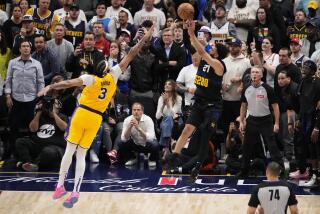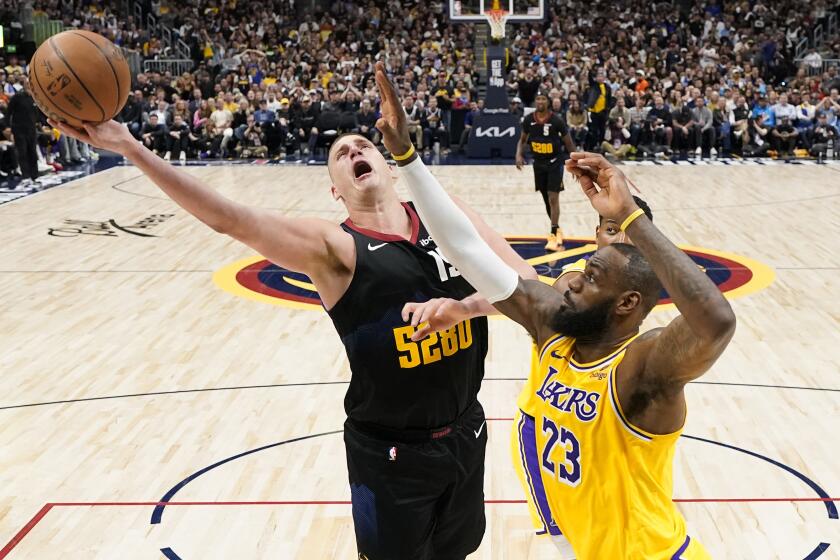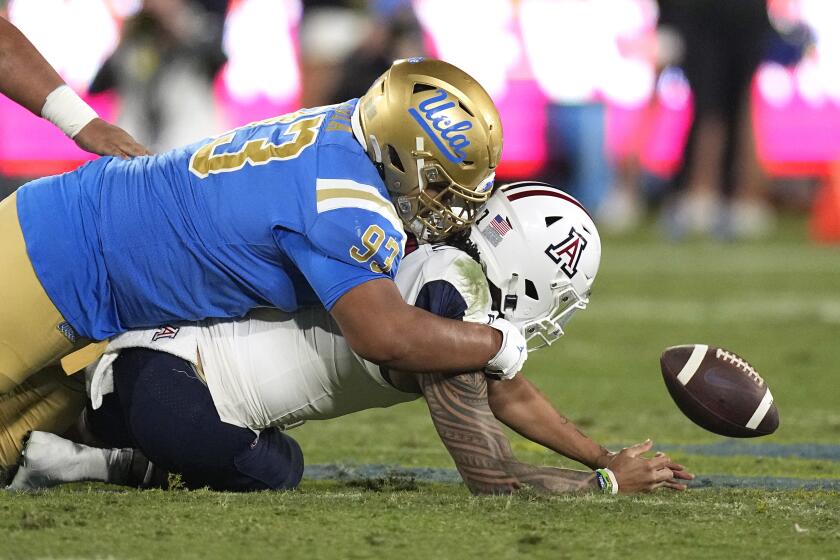Light weight champ
On this weekend of national gluttony, when second helpings are a holiday tradition, when belts are made for loosening and leftovers beckon, consider the plight of Scott Glicksberg.
A guy who looks at a plate of food and wishes for a little less.
A guy who steps on the scale and hopes for more.
As an offensive lineman for UCLA, Glicksberg has spent this season waging the battle of the bulge in reverse, pointing toward 300 pounds and falling short. The problem is, he explains, “I don’t really like to eat.”
Everyone knows about players working hard on the field, sweating through drills, hitting the blocking sleds, but college football demands other types of sacrifices. For Glicksberg, that means reshaping a body not quite large enough for his position, and dealing with an illness that changed his outlook on food.
“Sometimes he’s just not hungry when normal people are,” said Micah Reed, his roommate and fellow lineman.
Not a good thing among the massive people in the trenches.
“He has really good technique,” Reed explained. “But he’s so light that sometimes he can’t help getting thrown around.”
With the Bruins facing Arizona State in a key game tonight -- both teams fighting to preserve their slim bowl hopes -- Glicksberg doesn’t want to make a big deal about his problem. As a history major, the fifth-year senior realizes there are bigger issues in this world.
If only he could be one of them.
“Instead of thinking I can’t eat something because it has too many calories, I’m like ‘Oh, it only has this many calories?’ ” he said. “I mean, I have to eat five of them.”
Weight was never a problem in high school, where 285 pounds was plenty big enough.
Shifting to the larger, faster college game at UCLA, Glicksberg intended to bulk up while playing special teams through 2005 and 2006.
But during his sophomore year, he began feeling nauseated, his appetite fading to the point where he could not look at food. Much of what he forced down came right back up.
The doctors ran assorted tests, checking for everything from stress to cancer. Through it all, Glicksberg continued to attend classes and go to practice even though coaches held him out of drills. As offensive line coach Bob Palcic said: “You’ve got to respect his toughness.”
Finally, a specialist put him on medication for a suspected viral infection in his liver and within a few weeks the nausea and vomiting subsided. He was declared healthy, but his appetite never fully returned.
By that time, his weight had dropped to 240 and playing on the line was no longer an option. Glicksberg became a blocking tight end, remaining at that position through last season, suffering a shoulder injury that left a knot along his clavicle. Then a new coaching staff arrived.
Rick Neuheisel and his assistants took one look at the roster and noticed a shortage of offensive linemen. They asked Glicksberg to switch back, which required adding size.
“It’s not in his genetic predisposition to be really big, so he had to go over and above,” said Becci Twombley, the director of sports nutrition at UCLA. “We’re not just talking about eating 3,000 calories to gain weight. We’re talking 5,000 calories, and that’s a lot of food.”
While cheeseburgers and fries might have done the trick, Twombley recommended a healthier diet. Knowing Glicksberg’s ambivalence toward food, she devised a regimen of small, frequent servings.
The formerly ignored breakfast became mandatory. Glicksberg found himself gulping protein shakes and chewing on nutrition bars between classes, loading up at the training table each night.
“A lot of times, I just wouldn’t be hungry,” he said. “I’d have a few bites and feel full, but my plate would have to be clean before I could leave.”
One more thing: He had to eat before bedtime, maybe a burrito or a few peanut-butter-and-jelly sandwiches, anything to pack on the calories.
Twombley commonly sees weight and nutrition problems among athletes at her school. They are too heavy or too light. They choose the wrong foods. “There’s always something,” she said.
This season’s media guide suggested that Glicksberg’s diligence paid off. Listed at 300 pounds -- a generous interpretation, perhaps -- he started at left guard in the opener against Tennessee and later switched to right guard for several games.
But the rigors of the season soon eroded much of his gains, the scale’s pointer drifting left. He also ran into trouble a few weeks ago, briefly suspended for failing a drug test. He said the incident was embarrassing but declined to comment further.
“It’s been very, very difficult for him,” line coach Palcic said. “He works hard.”
No longer a starter, Glicksberg will be in the rotation tonight, trying to help a Bruins offensive line that has struggled mightily this fall. Neuheisel explained: “I don’t think he’s a 60- or 70-play guy. We’ll get [first-stringer Micah Kia] started and then Glicks will roll . . . they’ll both play.”
It’s largely a matter of girth. Glicksberg knows that.
An articulate young man with cropped hair and a neatly trimmed beard, he has tried to remain patient, saying “whatever I can do to help us win . . . if the coach told me to drop 100 pounds and play cornerback, I’d try.”
This philosophical approach goes only so far. Asked about his current weight, he winces slightly, tilting his head to one side.
Two-seventy-five. Ish.
Like so many people do, he appears to be fudging by a few pounds. But in the other direction.
--
More to Read
Get our high school sports newsletter
Prep Rally is devoted to the SoCal high school sports experience, bringing you scores, stories and a behind-the-scenes look at what makes prep sports so popular.
You may occasionally receive promotional content from the Los Angeles Times.







